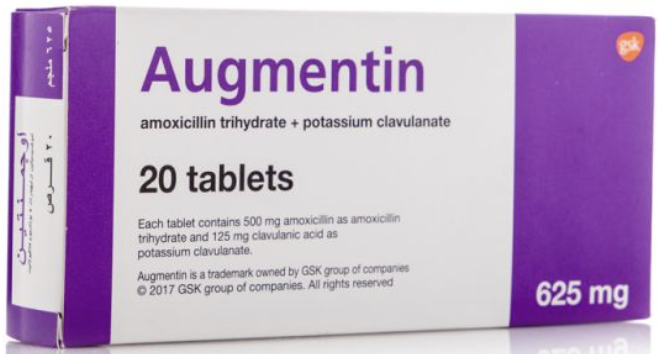 Augmentin is a widely used antibiotic that combines two active ingredients: amoxicillin and clavulanic acid. This combination is used to treat a variety of bacterial infections.
Augmentin is a widely used antibiotic that combines two active ingredients: amoxicillin and clavulanic acid. This combination is used to treat a variety of bacterial infections.
Mechanism of Action
-
Amoxicillin: It’s a broad-spectrum antibiotic belonging to the beta-lactam family, specifically a penicillin derivative. Amoxicillin works by inhibiting bacterial cell wall synthesis. It binds to penicillin-binding proteins (PBPs) within the bacterial cell wall, leading to the inhibition of the transpeptidation or cross-linking of peptidoglycans, which are critical components of the bacterial cell wall. This leads to cell lysis and death.
-
Clavulanic Acid: It’s a beta-lactamase inhibitor. Many bacteria produce beta-lactamase enzymes that can cleave the beta-lactam ring of penicillins and cephalosporins, rendering them ineffective. Clavulanic acid inhibits these enzymes, protecting amoxicillin from degradation and extending its spectrum of activity.
Pharmacokinetics
- Absorption: Augmentin is well absorbed from the gastrointestinal tract. Food intake does not significantly affect its absorption.
- Distribution: It is widely distributed in body tissues and fluids.
- Metabolism: Amoxicillin is partially metabolized in the liver, but clavulanic acid is extensively metabolized.
- Excretion: Both components are excreted primarily through the kidneys.
Therapeutic Uses
Augmentin is used to treat a variety of infections caused by susceptible strains of bacteria, such as:
- Respiratory tract infections (e.g., sinusitis, pneumonia, bronchitis)
- Urinary tract infections
- Skin and soft tissue infections
- Otitis media
- Infections in patients with compromised immune systems
- It is also used in the treatment of dental infections and prophylaxis in certain surgical procedures.
Adverse Effects
Common adverse effects include:
- Gastrointestinal disturbances (nausea, vomiting, diarrhea)
- Allergic reactions (rash, pruritus, and in rare cases anaphylaxis)
- Superinfections, including Clostridium difficile-associated diarrhea
- Hepatic dysfunction (rare)
- Renal toxicity (rare)
Special Considerations
- Allergies: Patients with a history of penicillin allergy should avoid using Augmentin.
- Pregnancy and Breastfeeding: Augmentin is generally considered safe during pregnancy and breastfeeding, but it should be used under medical advice.
- Renal Impairment: Dose adjustments may be necessary in patients with renal impairment.
Resistance
Like all antibiotics, the misuse and overuse of Augmentin can lead to antibiotic resistance, which is a growing concern in the medical community. It’s essential to use this medication judiciously and only when necessary.
Clinical Relevance
As a medical doctor, understanding the implications of using Augmentin, its appropriate indications, and the potential side effects is crucial in clinical practice. It’s also important to counsel patients on the proper use of antibiotics and the importance of completing the prescribed course to prevent resistance. Regular monitoring for adverse effects, especially in long-term use, is advised.